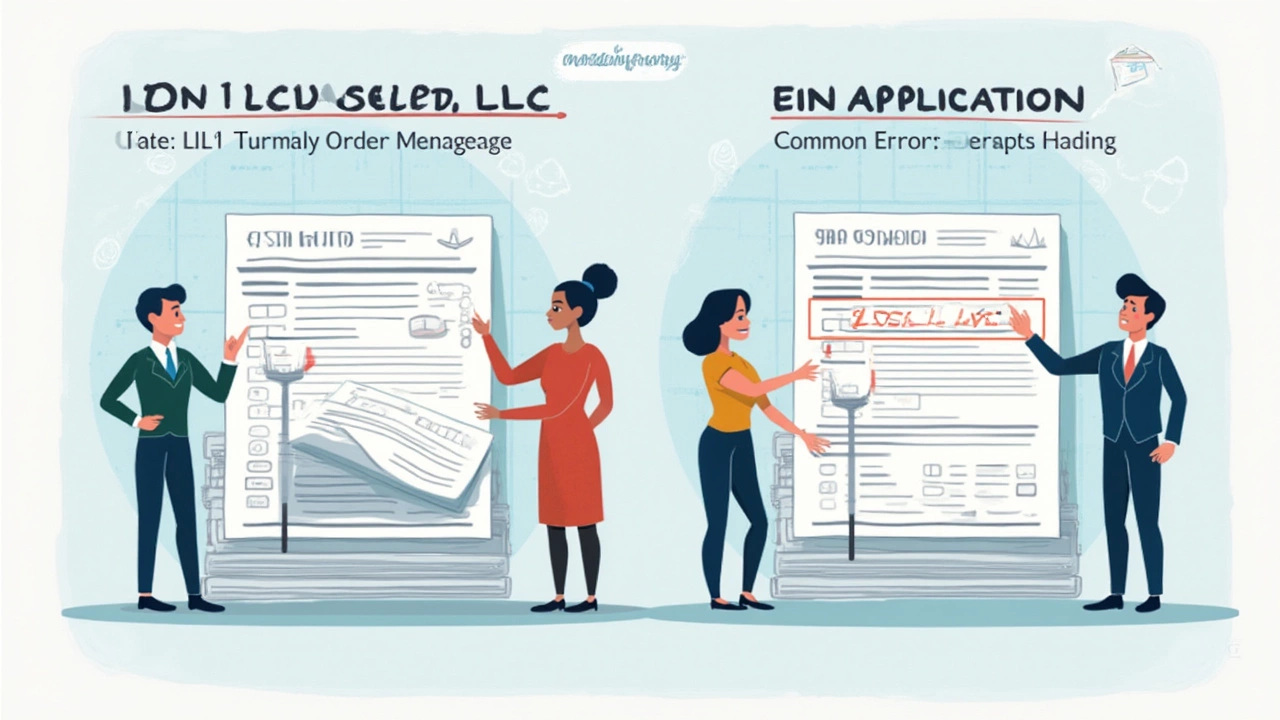Ever get tangled trying to figure out if you should snag an EIN or form an LLC first? You’re definitely not alone. Tons of new business owners run into this exact question—and honestly, the order can have a bigger impact on your time (and sanity) than you’d think.
If you want to keep your business legit and avoid government mix-ups, you’ve got to get this sequence right. The wrong move could mean paperwork headaches, delays opening a business bank account, or worse, having to redo steps altogether. Think of it as unlocking a new game level: no skipping ahead.
The main takeaway? The step you take first depends on what you want for your business, but there’s a clear best-practice path for most folks starting fresh. I’ll walk you through exactly what you should do, why you shouldn’t listen to confusing online forums, and how a mistake here can set you back weeks.
- EIN vs LLC: What's the Real Difference?
- What Comes First and Why It Matters
- Step-By-Step Order: Doing It the Smart Way
- Common Mistakes and How to Dodge Them
- Tips for a Smoother Registration Process
EIN vs LLC: What's the Real Difference?
A lot of people mix these up: EIN and LLC aren’t even the same kind of thing. Here’s how it actually breaks down.
LLC stands for Limited Liability Company. That’s a legit business structure—like having a shell that separates your personal stuff from your business stuff. If your business gets sued or owes money, your personal car or house isn’t on the hook. An LLC exists because you filed paperwork (usually with your state) and got it officially approved. It’s all about protecting yourself and making your business more “real” in the eyes of banks and customers.
An EIN—Employer Identification Number—is basically a Social Security Number, but for your business. The IRS uses it to track your business taxes. Even if you don’t plan to hire employees right away, most banks won’t let you open a business account without it. You apply for an EIN through the IRS, and it’s free as long as you’re dealing direct with them.
Let’s look at the comparison in simple terms:
- EIN: Tracks your business for federal tax purposes, is required to hire employees, and is usually needed to open a business bank account.
- LLC: Is your actual business structure—the official shell that separates your personal liability from your business risks.
So, one is your business’s ID number for the IRS; the other is the paperwork that says your business even exists in the eyes of your state. You’ll almost always need both, but they serve totally separate jobs. Skipping one or doing them out of order can cost you real time and money, which is why it’s worth knowing the difference before starting your business registration journey.
What Comes First and Why It Matters
This trips up almost everyone: should you get your EIN or your LLC first? Here’s the basic rule—if you’re forming a new company, set up your LLC before you ask the IRS for an EIN. Why? Because your EIN application needs the legal name and details of your business entity. If you get that order wrong, the whole process could get messy.
Here’s how it works:
- The LLC comes first. You register your business with the state, lock down your business name, and get your official formation documents (like Articles of Organization).
- Once you have proof your LLC is legit, you head to the IRS website and apply for your EIN. The IRS form will ask for your LLC’s legal name and formation date. They want evidence you’re an actual business, not just filling out random forms.
An important fact: If you want to operate as a sole proprietor (no LLC), you can grab an EIN without forming a company. But if your plan is to run as an LLC (or any other legal entity), always do the LLC first.
If you mess up the order and try getting your EIN first, you could end up with an EIN tied to the wrong entity type, or you might need to cancel and reapply. That means extra paperwork and possible delays with your bank or clients.
Banks almost always want to see both your LLC documents and your matching EIN letter before they even think about letting you open a business account. And if you change your business structure after getting the EIN, your bank may tell you to go start over. So, save yourself that headache. LLC goes first, then EIN—simple as that for most new businesses.

Step-By-Step Order: Doing It the Smart Way
Let’s cut through the noise. If you’re asking whether to get your EIN or your LLC first, the smart money says this: form your LLC first, then grab your EIN. Doing it the other way can leave you with an EIN tied to a business name or status that doesn’t match what the IRS—or your bank—expects.
Here’s how you make it easy on yourself:
- Form Your LLC. Head to your state’s Secretary of State website (every state is different), and fill out the Articles of Organization. This step officially creates your business in your state’s eyes. You’ll get confirmation—sometimes instantly, sometimes it takes a few days.
- Get Your EIN From the IRS.
- Now that your LLC exists, you can apply for your EIN free on the IRS website.
- The IRS form asks for your legal business name and structure—stuff you need to have locked down after the LLC is registered.
- Your EIN is like your business’s Social Security Number. You’ll use it for taxes, banking, hiring, and more.
- Open Your Business Bank Account.
- Banks will want your approved LLC paperwork and your EIN letter before setting up an account. The right order saves you from those awkward "come back with the right docs" conversations.
People sometimes think they can speed-run things and get the EIN first. That’s only smart if you’re a sole proprietor or partnership and haven’t bothered with an LLC (which, honestly, leaves you personally exposed to risks).
The IRS even says on its website: “If you’re forming an LLC, apply for your EIN after the LLC is approved by your state.” Go straight to the source—no guesswork here.
Mess up the order? You could wind up with an EIN that’s not attached to your real business structure—a pain to fix. Not to mention, a 2022 business banking survey found that close to 62% of new entrepreneurs had their first application for a business account delayed or denied just because their EIN and LLC paperwork didn’t match up. That’s wasted time and lost business.
| Step | Typical Time | Cost |
|---|---|---|
| LLC Formation | 2 hours – 2 weeks (state-dependent) | $50-$500 (filing fee varies by state) |
| EIN (IRS) | 10 minutes online | Free |
Bottom line? Get your structure (LLC) in place, then score your EIN. This sequence keeps everything legal and smooth, especially when banks and tax time roll around.
Common Mistakes and How to Dodge Them
Even the most motivated new business owners mess up the EIN and LLC process. The good news? Most of these goofs are totally avoidable if you know what’s coming.
The biggest headache is folks rushing to get an EIN from the IRS before setting up their LLC. Here’s why that bites: the EIN application asks for your legal business name, and if you haven’t formed your LLC yet, you risk using a name that’s already taken or gets rejected by your state. That means you’ll have an EIN tied to a business name that technically doesn’t exist, and you may have to chuck the whole thing and start over—a huge waste of time.
Another classic slip-up is using your Social Security Number for business stuff when you already have or need an EIN. This can muddy your personal and business taxes, making things messy when it comes to accounting—and even riskier if you end up in an IRS audit.
- Not checking name availability with your state before applying for the EIN
- Using a personal address or mixing personal and business addresses
- Applying for an EIN as a sole proprietor and then trying to add LLC members later (the IRS may require a new EIN)
- Thinking the EIN itself makes your business official—it doesn’t! You need your LLC filed first
- Forgetting to save digital and printed copies of all your documents as soon as you get them (emails vanish, PDFs disappear, printers jam—you get it)
Check out how often these mistakes hit new businesses every year:
| Mistake | % of New Businesses Impacted (2024 IRS Data) |
|---|---|
| Using wrong business name on EIN | 24% |
| Applying for EIN before LLC formed | 33% |
| Mixing personal and business info | 18% |
| Forgetting to save tax docs | 12% |
So what actually works? Line up your LLC first, check the name with your state, and EIN comes next. Keep your business info separate from your personal. And download, print, and back up every document in three places (seriously). This will keep your business out of the ditch and moving forward.

Tips for a Smoother Registration Process
Registration doesn’t have to be a two-month headache. With the right steps, you can go from scratching your head to getting official paperwork without the midnight stress scrolls. Here’s how to keep things moving and avoid the stuff that slows most people down.
Start by checking your state’s business registration site. That’s where you’ll file for your LLC, and every state has its own quirks—some are digital, some want snail mail, some pull surprise extra fees. Oddly enough, places like Delaware and Wyoming see more LLC registrations because of their business-friendly rules. In 2024, Delaware processed about EIN requests for nearly 250,000 new LLCs—that’s more than twice the national state average.
When filling in your LLC info, double and triple-check your business name spelling. Almost half of rejected LLC applications come from basic typos or picking a name already taken, according to a 2024 NASS report. Use your state’s online database to make sure the name is good to go.
Don’t apply for your EIN until your LLC is officially registered. The IRS will ask for your LLC details, and if you jump the gun, you’ll probably have to reapply, wasting days or even weeks. Once you have those state docs, use the IRS’s free EIN application—avoid sites that charge you $100 for the same thing you get for free.
Have your personal info, business address, and LLC paperwork handy. Nothing stalls the process like hunting for your Social Security number or digital copies while in the middle of an application.
- Bookmark both your state’s and the IRS’s official application sites—the URLs are surprisingly similar to scam sites.
- Check what licenses or permits your city might need. Some places want paperwork before you open for business, even if you’re online-only.
- Keep digital and paper copies of everything. Banks will want to see original LLC papers plus your EIN letter before letting you open a business account.
Here’s a quick data snapshot of average processing times in 2025 for LLCs and EINs:
| State LLC Filing (Avg. Days) | IRS Online EIN (Minutes) | IRS Mail EIN (Weeks) |
|---|---|---|
| 7 | 10 | 4 |
If you’re planning to hire, apply for business credit, or just want to look professional, don’t leave this stuff till the last second. The sooner you register right, the smoother everything else falls into place.


